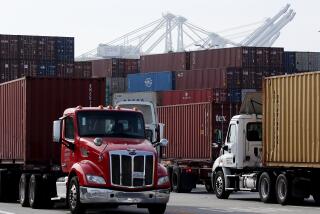First fuel-efficiency and greenhouse-gas emissions standards for trucks announced
- Share via
Reporting from Washington — President Obama announced the first fuel-efficiency and greenhouse gas standards for long-haul rigs, work trucks and other heavy-duty vehicles Tuesday, the second mileage pact with manufacturers in less than a month.
The regulations call for reductions on fuel consumption and greenhouse-gas emissions by 2018 of 9% to 23%, depending on the type of vehicle. Trucks and other heavy vehicles make up only 4% of the domestic vehicle fleet, but given the distance they travel, the time they spend idling and their low fuel efficiency, they end up consuming about 20% of all vehicle fuel, according to the Union of Concerned Scientists.
Experts say that a 20% reduction in heavy-vehicle emissions would boost fuel efficiency to an average of 8 miles per gallon from 6 mpg now.
The announcement comes less than two weeks after Obama and the country’s automakers unveiled new fuel economy rules for passenger vehicles that would boost fleet-wide average gas mileage to 54.5 mpg by 2025, from about 27.8 mpg now.
The success of the Obama fuel-efficiency program, some of it hard won through difficult talks with carmakers, stands in sharp contrast to the failure of other environmental initiatives such as climate change legislation.
At a time when nearly all major corporate lobbying groups and the Republican Party insist that the administration’s environmental regulations destroy jobs, the automakers, the United Auto Workers union and truck and large engine manufacturers are collaborating on rules they say could create jobs. Most environmental groups also praised the new truck standards.
The automobile industry has been more cooperative with the government since the federal bailout of two major carmakers, General Motors and Chrysler. It is also mollified by the fact that the new, 2025 auto rules have what critics consider loopholes that allow the carmakers to improve fuel efficiency on their most popular models at a slower pace.
Moreover, the new standards encourage car and truck makers to use off-the-shelf technology, some of which they have already deployed, rather than invest in scientific breakthroughs.
More to Read
Inside the business of entertainment
The Wide Shot brings you news, analysis and insights on everything from streaming wars to production — and what it all means for the future.
You may occasionally receive promotional content from the Los Angeles Times.











